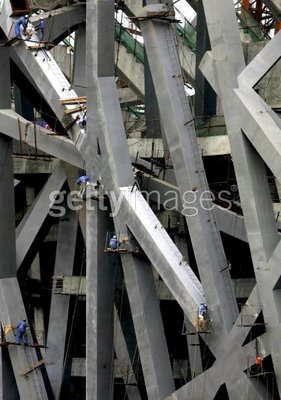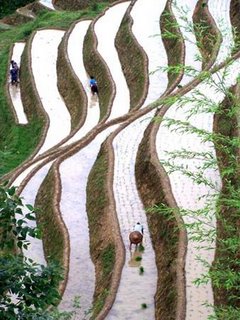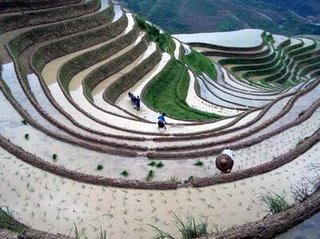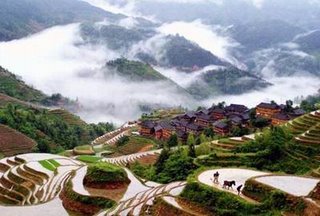Rise of the Red Dragon
Latest News | Travel | Developments | Food | Culture | Entertainment
Friday, June 30, 2006
Tuesday, June 27, 2006
China's trade surplus may hit 130 billion dollars in 2006

China's trade surplus may hit a new high of between 120 billion and 130 billion U.S. dollars in 2006, Bi Jingquan, the deputy head of the National Development and Reform Commission (NDRC) has estimated.
Bi was quoted by Monday's China Securities Journal as saying the huge trade surplus is a direct result of the fiscal and tax policies.
China should improve its policies concerning tax rebates for exports and processing trade, Bi said at an international symposium on the reform of China's public fiscal policy held in Beijing at the weekend.
According to figures from the General Administration of Customs, China had a record trade surplus of 101.8 billion dollars in 2005, the twelfth consecutive year in which China posted a trade surplus.
The huge trade surplus has led to increased trade disputes between China and its main trade partners and vociferous calls for the appreciation of the Chinese yuan.
A new surplus high in 2006 will bring even greater challenges to the exchange rate of the yuan, the report said.
Source: Xinhua
Tags: China | Developments | Economy
Shanghai Disneyland Awaits Approval
Disney theme park awaiting gov't nod
The boss of Disney has confirmed the firm is awaiting approval from the Chinese Government to build a theme park in Shanghai after successful talks with city leaders.
Group Chairman George Mitchell said the company had been in discussions with Shanghai officials for "a long period of time" to build a new Disneyland in the metropolis.
He added talks were now under way between the Shanghai municipal government and the State Council, which has the final say over the project.
"Our discussions have been with Shanghai officials, and now they are engaging with the national officials," said Mitchell.
"We have an interest in proceeding and we hope that satisfactory terms can be worked out and we can proceed."
Mitchell made the comments to China Daily while in Beijing to attend the official opening of a branch of DLA Piper, a global law firm of which he is also the chairman.
Speculation over Disney's plan to open a theme park in Shanghai intensified after the opening of Disneyland Hong Kong last September.
Mitchell insisted there was a market for both attractions, and that a new park in Shanghai would not be detrimental to the long-term success of the Hong Kong site.
"There has been very careful analysis from us and Chinese Government officials," he said.
"There are a very large number of people in the Shanghai area and we don't think that this (a new park) will have any more of a negative effect on Hong Kong than say having a park both in California and Orlando, Florida.
"We are looking forward to a long and what we hope will be a productive relationship in Hong Kong and Shanghai."
While Mitchell said he was "very pleased" with the operation in Hong Kong, he admitted there had been some problems.
During the Chinese New Year holidays in February, the park had to close its gates to hundreds of visitors holding pre-purchased tickets after it reached the maximum accommodation capability soon after opening.
"These kinds of issues always occur at every new park in different contexts, but we try to work them out and we try to be sensitive to what local people want," said Mitchell.
"We always make very careful plans over how we are going to operate, but things can never turn out exactly as you predict.
"There is always a period of adaptation."
As previously reported, it is believed an area of land in Pudong's Chuansha area has already been earmarked for the Shanghai park.
Mitchell said it was impossible to put a timeframe on the project.
"We try to proceed as quickly as possible after the execution of the contract, but until we execute a contract we don't get into when we are going to start," he said.
Source: ChinaDaily
Tags: China | Developments | Shanghai
Monday, June 19, 2006
Solar halo seen in eastern Beijing

BEIJING, June 19 -- An excellent solar halo appeared covering eastern Beijing's sky at noon on Sunday.
The scene was spectacular with the bright sun surrounded by colorful rings of light. The phenomenon lasted for about 30 minutes.
The solar halo is an atmospheric optical phenomenon that can be seen unexpectedly frequently, for example, when the weather changes for the worse.
(Source: CRIENGLISH.com)
Tags: China | Science | Beijing
Hawking to discuss origin of universe in Beijing

Theoretical physicist Stephen Hawking has arrived in Beijing in advance of his lecture at the Great Hall of the People on Monday morning.
Hawking will discuss the origins of the universe at Strings 2006, an international conference on string theory hosted by the Chinese Academy of Sciences Institute of Theoretical Physics.
In response to public demand from Chinese audience the organizers will arrange a second lecture from Hawking on June 21.
Hawking has spent a lifetime trying to unravel the basic laws which govern the universe.
In 1988, Hawking published his great book, A Brief History of Time: From the Big Bang to Black Holes, which is still considered by the scientific community to be a milestone.
Hawking has visited the Chinese mainland twice. Prior to arriving in Beijing, he spent several days in Hong Kong.
Hawking, who suffers from amyotrophic lateral sclerosis (ALS), communicates with others through a computer synthesizer. He is being cared for by five nurses during his trip to Beijing.
Source: Xinhua
Tags: China | Science | Beijing
Sunday, June 18, 2006
Hong Kong's Millionaires add to wealth, get younger
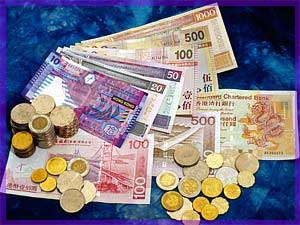
The wealth of Hong Kong dollar millionaires surged last year, even as their numbers remained stagnant, according to a Citibank survey.
Hong Kong's 274,000 millionaires increased their wealth 17.6 percent on the back of strong economic growth and a bullish stock market, the annual Citibank Hong Kong Consumer Wealth Review found.
On average, each held about HK$4 million in liquid assets last year, up from HK$3.4 million a year earlier.
For the purposes of the survey, to be a considered a millionaire, an individual must have liquid assets of HK$1 million or more. Property assets do not qualify.
The review, conducted every year since 2003, polled by phone more than 3,000 Hong Kongers, with ages ranging from 21 to 79, between November and mid-December for the 2005 edition.
It found the number of millionaires composed 5.3 percent of the adult population within the survey age group - that is, five millionaires in every 100 Hong Kongers.
The age of the group is getting younger, with those under 40 swelling to 26 percent last year from 23 percent in 2004, according to the survey.
"When the investment market and economy perform well, more jobs are available and salaries rise, so Hong Kong's working population gets wealthier," said Weber Lo, chief operating officer and director of retail banking at Citibank.
"That may explain why the age of Hong Kong millionaires is getting younger."
Their numbers and wealth will keep rising this year, given the continuing expansion of the local economy, Lo said.
Citibank estimates the city's economy will grow between 4 and 5 percent this year, slower than the 7.3 percent surge in 2005.
The Hang Seng Index, a benchmark for the Hong Kong stock market, rose 4.5 percent last year. The bullish stock market adds wealth to millionaires since stock investment is their major liquid asset, Lo said.
About 49 percent of respondents said most of their gain in liquid assets came through investment in non- property assets, such as stocks, mutual funds and time deposits, while 25 percent said their gains came mostly from property investment. The estimated 274,000 millionaires had distributed 32 percent of their average HK$4 million liquid assets in stocks, 36 percent in deposits, 16 percent in mutual funds, 8 percent in bonds, and the remaining 8 percent in other investment tools.
The better investment sentiment in 2005 prompted 77 percent of the millionaires to invest in stocks, compared with 73 percent in 2004; while 65 percent placed their liquid assets into time deposits in the face of rising interest rates last year. Saving deposit rates, for example, have increased to about 2.75 percent from almost zero in early 2005.
The survey also verified common knowledge that more wealthy residents are clustered on Hong Kong Island. It found that one in seven Hong Kong Island residents are millionaires, against one in every 35 people in Kowloon and one in 28 in the New Territories and Islands.
Source: HKStandard
Tags: China | Wealth | Hong Kong
World Bank urges China to boost public transport
BEIJING (Reuters) - China needs to improve public transport to help curb choking traffic jams instead of building more and more highways to make room for private cars, the World Bank said on Wednesday.
Too few Chinese cities had devised coherent urban transport plans while those that had often failed to stick to them, it said.
"A major challenge for the Chinese cities now is how to develop an efficient bus transport system before the critical mass of motorists is formed and shapes an irreversible, auto-dependent land use pattern," it said.
Urban transport problems in China were beginning to affect the productivity of workers and lead to excessive conversion of agricultural land, it said.
Most cities needed to find alternatives to urban rail networks given the high costs involved and the length of time spent on building such systems.
Chinese cities, including even second-tier ones, are already investing billions of dollars in new or expanded subway systems.
By 2010, 35 percent of Shanghai's commuters are expected to use the subway, up from 12 percent in 2005, by which time Shanghai will have 11 subway lines totalling 400 km (240 miles), state media has said.
In Beijing -- where about 1,000 new vehicles take to the road a day -- the average speed during peak hours on the city's arterial roads had dropped by half in the last decade, the report said.
And in the southern boomtown on Shenzhen, across the border from Hong Kong, traffic accidents have been the top killer for the last three years, it added.
Tags: China | Development | Beijing
Shanghai is World's Largest City By Population
LARGEST CITIES ON THE PLANET!
Numbers shown are the population within the recognized city limits, and do not include people living in the immediate surrounding area outside of the established border of the city. For the largest metropolitan areas refer to the list below this one.
Revised (10/01/04)
Shanghai, China 13.3 million
Mumbai (Bombay), India 12.6 million
Buenos Aires, Argentina 11.92 million
Moscow, Russia 11.3 million
Karachi, Pakistan 10.9 million
Delhi, India 10.4 million
Manila, Philippines 10.3 million
Sao Paulo, Brazil 10.26 million
Seoul, South Korea 10.2 million
Istanbul, Turkey 9.6 million
Jakarta, Indonesia 9.0 million
Mexico City, Mexico 8.7 million
Lagos, Nigeria 8.68 million
Lima, Peru 8.38 million
Tokyo, Japan 8.3 million
New York City, USA 8.09 million
Cairo, Egypt 7.6 million
London, UK 7.59 million
Teheran, Iran 7.3 million
Beijing, China 7.2 million
Source: WorldAtlas
Tags: China | Environment | Shanghai
DNA test to clear up Confucius confusion

SHANGHAI (Reuters) - Chinese claiming Confucius for an ancestor can now use a genetic test to prove a direct blood connection to the grandfather of Chinese social mores, a state newspaper said on Friday.
The fifth-century BC social philosopher's ideas of filial piety and deference to elders influence Chinese society and politics even today.
Now his countrymen can establish a genetic link in a test that will cost more than 1,000 yuan ($125), according to the Shanghai Morning Post.
"We would like to help these unconfirmed claimants to test their DNA and to establish a Confucius-DNA database," it quoted Deng Yajun, a DNA expert from Beijing Institute of Genomics at the Chinese Academy of Science, as saying.
How the scientists had obtained a sample of Confucius's DNA was not explained.
"One of the most difficult things in the project is to confirm the blood connections of these numerous claimants," said Kong Dewei, one of the editors of the new family tree, who has the same Chinese surname of Confucius, "Kong" in Chinese.
Association with Confucianism was fatal during the tumult of the Cultural Revolution, when "old China" and its traditions were condemned as reactionary by fervent Communist Red Guards.
But since the 1990s, Beijing has been encouraging Confucianism as part of celebrating traditional Chinese culture -- and of pushing a message of obedience to those in power.
($1=7.997 Yuan)
(Source)
Tags: China | News | Culture
Saturday, June 17, 2006
Air China inks deal for 24 Airbus A320 planes

Air China inked a deal with Airbus for buying 24 Airbus A320 planes, Shanghai Securities News said on Friday.
Under the 1.744-billion-U.S. dollar deal signed between the two sides on Thursday, the China national carrier will pay Airbus cash in installment.
The planes are expected to be delivered to China between 2007 and 2010.
Air China said the joining of the Airbus A320 airplanes will help upgrade its carrying capacity and cement Beijing's position as a communication hub. It will launch more domestic routes from Beijing, it said.
The report said the deal is part of the nearly 10 billion U.S. dollars agreement signed by China Aviation Supplies Corp and Airbus last December.
The corp has ordered 150 Airbus A320 planes, which will be distributed to Air China, China Eastern Airlines, Sichuan Airlines, China Southern Airlines, Shenzhen and Hainan Airlines
The shares of Hong Kong-listed Air China closed at 2.925 Hong Kong dollars on Thursday, up 2.632 percent.
Source: Xinhua
Tags: China | Economy | Development
Fashion designer wants China on the map
Chinese fashion designer Wang Wei, working out of Shanghai, is determined to break out of the cultural template of conformity.
The Washington Post reported that Wang, 34, is not yet a name on the fashion runways of Paris and Milan, but his artsy, individualist designs give him hope of reaching that status.
Known for his stylish dresses designed mainly for women abroad, Wang plans to create a haute couture collection that will put China on the map of high fashion.
Wang says his trouble with innovation lies with the rest of China in that the country has always had a culture of conformity. Wang says China needs to break out of the habit of anchoring itself to other's inventions to gain prominence in the fashion world and in other industries as well.
Source: UPI
Tags: China | Shanghai | Fashion
Sixteen of the 20 most polluted cities in the world are in China
According to CNN, the World Bank recently examined 20 of the most severely polluted cities in the world. Sixteen of these cities are located in China, and Linfen City, in Shanxi Province, was cited as the world's most polluted city.
Apple Daily reported that factories in Linfen continuously release waste gas and sewage. The whole city smells and is covered in smoke. The trees around the factories are all withered. The polluted water is like thick oil, and the polluted rivers have caused a higher incidence of cancer among citizens living in the area.
One environmental expert said, "If you have a grudge against someone, let this guy become a permanent citizen of Linfen! Why? For punishment!"
The problem of air pollution in China's cities remains serious. In 2005, 39.7 percent of the 522 cities surveyed were either moderately or seriously polluted.
Last year, environmental disputes and large-scale protests increased 30 percent compared to the previous year. Over 50,000 incidents were documented. Among these cases, 50.6 percent were about water pollution, and nearly 40 percent were related to air pollution.
Pan Yue, vice director of the State Environmental Protection Administration of China said, "Environmental problems have become a main factor affecting China's national security and social stability."
Zhang Lijun, another vice director of the Administration, said, "In some areas, corrupted officials protect local polluting industries to gain personal profits. Without clean officials, there will be no clean water."
Source: CNN
Tags: China | Environment | Beijing
Wednesday, June 14, 2006
Tuesday, June 06, 2006
China to control weather during 2008 Olympics
HONG KONG, China (CNN) -- Beijing will be shooting for the stars in a bid to stave off downpours when it hosts the Olympics Games in 2008.
Using an arsenal of rockets, artillery and aircraft, China will try to blast the clouds out of the sky, a meteorologist from Beijing told a Hong Kong newspaper, through a technique which falls under the umbrella of "cloud seeding."
"We sometimes turn a cloudy day into a dry and sunny one by shooting the clouds less intensively than when we make rain," head meteorologist Mian Donglian for the Beijing municipal weather bureau told The South China Morning Post.
By shooting shells containing chemicals like silver iodide, or dry ice into the sky, scientists say they can create rain. China has gone so far as to set up a weather modification office that is in charge of such an endeavor.
When the guns go off, they scatter crystals that attract water droplets in the cloud, making them grow faster, said climate and weather expert Johnny Chan from the City University of Hong Kong. The crystals become heavy and fall as raindrops, he said.
Planes, too, can be used to drop chemicals onto clouds to manipulate the weather.
In the case of the Olympics, climate experts will pore over satellite images to find ways to dissolve the clouds rather than make it rain.
"Scientists fly an airplane, sampling the cloud ... to see if there is potential for it to work, and if it is likely to work, they will shoot the gun," Chan said.
(article continued)
Tags: China | Beijing | Olympic
Photo: Flying PLA
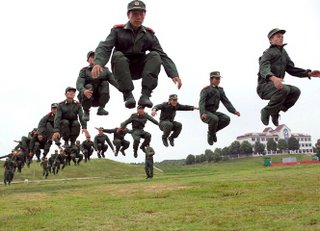
Chinese police train at a military base in Wuhan in central China's Hubei province August 30, 2005. China was setting up elite police squads in 36 cities to counter the threat of "terrorist crimes" and to put down riots, Xinhua news agency reported. Beijing has already stepped up security ahead of the 2008 Olympics. CHINA OUT REUTERS/China Newsphoto
Tags: China | Military | Photos
Ancient engraved chessboards found on Great Wall
Archaeologists have found two ancient engraved chessboards probably used by soldiers on the Great Wall more than 700 years ago at Qinhuangdao, North China's Hebei Province.
The two boards, one for Chinese chess and the other for the ancient game "Tiger Eats Sheep", were engraved on a stone in front of a Great Wall beacon tower possibly in the Song Dynasty (960-1279), said officials with the provincial department of cultural relics.
Archaeologists believe that soldiers from all parts of ancient China used to play chess to while away the time on the remote wall.
The chessboards were never mentioned in documents on the Great Wall or in local chronicles, said an official.
However, more work was needed to identify the exact date of the boards, he added.
Archaeologists have also found 17 Chinese characters in five lines engraved on a stone nearby, of which the names of two soldiers are still clear.
China's first emperor, Qinshihuang, founder of Qin Dynasty, had the Wall built as a defense by over one million workers in 12 years against attack by the Xiongnu, an ancient nationality in North China.
Rebuilt many times through the centuries, the wall stretches 6,000kilometers from Jiayuguan Pass in northwestern Gansu Province to end at Shanhaiguan Pass on the shores of Bohai Bay in the east.
Source: Xinhua
Tags: China | News | Culture

